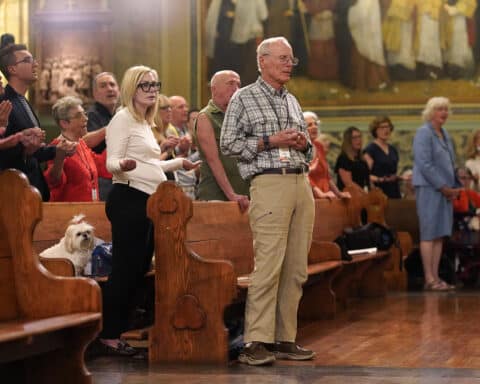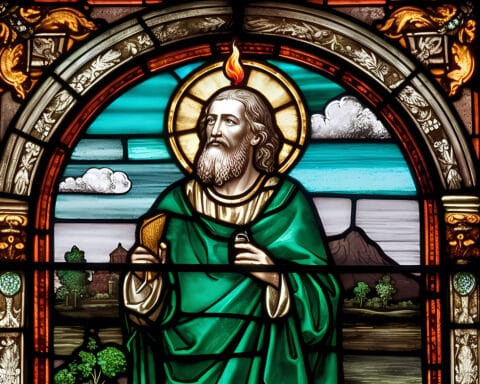In the Gospel of Mark, it is rare for a disciple or one of Jesus’ interlocutors to understand him.
The scribe asks Jesus, “What is the first of all commandments?” Jesus responds that all the commandments are fulfilled in the divine ordinance to love God with all one’s heart, soul and strength. He gives more than the scribe asks, teaching that the love of neighbor is second and thus a consequence of the first.
Typically, in the Gospels, here is where there would be conflict. We could imagine the scribe saying, “But what about the regulations of the Temple?” “But who really is my neighbor?”
The scribe doesn’t. He praises Jesus’ teaching. And he, like our Lord, adds something. The scribe riffs off of Jesus, declaring that the love of God and neighbor is “worth more than all burnt offerings and sacrifices” (Mk 12:33). Jesus not only doesn’t correct this ambitious scribe. Jesus announces, “You are not far from the kingdom of God” (Mk 12:34).
| 31st Sunday in Ordinary Time – Nov. 4, 2018 |
|---|
|
DT 6:2-6
PS 18:2-3, 3-4, 47, 51
HEB 7:23-28
MK 12:28B-34
|
The scribe embodies an attitude essential to the disciple, to the baptized son and daughter of Jesus Christ within the Church. He knows the Scriptures well enough that he is able to recognize the truth of what Jesus teaches. Our Lord does not overthrow the Law or contradict what has come before. Instead, he describes the heart of the Scriptures. God has loved Israel into existence, and therefore Israel must offer this very same gift of love in return.
The love of neighbor is intimately tied to the love of God. The God who chose Abraham, Isaac and Jacob, who rescued Israel from slavery in Egypt, has chosen merciful love. The love of neighbor is therefore a privileged mode of worshipping this God. To love one’s neighbor, especially the widow and the orphan, is the manner in which we express love of God.
The scribe knows the Scriptures, and thus can recognize how Jesus summarizes the law.
But submission to the wisdom of God does not mean we human beings have nothing to add. Having immersed himself in the Scriptures, having approached Christ’s words with an attitude of sonship, he is ready to add to them. He becomes an interpreter of the Word of God, showing how this radical love is the fulfillment of every dimension of the law.
Many times, Catholics understand how to submit to the Scriptures, to the teachings of Jesus, and to the precepts of the Church. But the scribe shows us that this isn’t enough. We have something to add. This doesn’t mean that we’re unfaithful to the Scriptures, adding something that is not found in Holy Writ.
Jesus Christ presumes that his disciples will need to riff off his teachings. We’ll need to show how the love of God means the rejection of all powers of the age — warfare, idolatry of a particular political platform, or an individualism that forgets that we’re created for relationship.
We’ll also need to show how the love of neighbor is a consequence of our love of God. Following the precepts of the Scriptures, we’ll create institutions that enable us to love our neighbor — economies of communion rather than exclusion and politics of gratitude rather than blame.
We receive the Tradition, and then we riff with Jesus. We return to the Church forms of life that change forever what it means to be a Christian.
The Church calls such riffing with Jesus, sainthood.
Timothy P. O’Malley, Ph.D., is managing director of the McGrath Institute for Church Life.





